Deck 16: Vector Calculus
Question
Question
Question
Question
Question
Question
Question
Question
Question
Question
Question
Question
Question
Question
Question
Question
Question
Question
Question
Question
Question
Question
Question
Question
Question
Question
Question
Question
Question
Question
Question
Question
Question
Question
Question
Question
Question
Question
Question
Question
Question
Question
Question
Question
Question
Question
Question
Question
Question
Question
Question
Question
Question
Question
Question
Question
Question
Question
Question
Question
Question
Question
Question
Question
Question
Question
Question

Unlock Deck
Sign up to unlock the cards in this deck!
Unlock Deck
Unlock Deck
1/67
Play
Full screen (f)
Deck 16: Vector Calculus
1
Compute the work done by the force field  along the curve C, where C is the line segment from (2, 1) to (3, 5).
along the curve C, where C is the line segment from (2, 1) to (3, 5).
A)
B)
C)
D)
 along the curve C, where C is the line segment from (2, 1) to (3, 5).
along the curve C, where C is the line segment from (2, 1) to (3, 5).A)

B)

C)

D)


2
Evaluate ![<strong>Evaluate , where C is the quarter circle from to . [Hint: ]</strong> A) B) C) D)](https://storage.examlex.com/TB5869/11eaa88b_929b_195a_a696_9f6cdab65f4b_TB5869_11.jpg) , where C is the quarter circle
, where C is the quarter circle ![<strong>Evaluate , where C is the quarter circle from to . [Hint: ]</strong> A) B) C) D)](https://storage.examlex.com/TB5869/11eaa88b_929b_406b_a696_77ba4dedcf2e_TB5869_11.jpg) from
from ![<strong>Evaluate , where C is the quarter circle from to . [Hint: ]</strong> A) B) C) D)](https://storage.examlex.com/TB5869/11eaa88b_929b_677c_a696_87c4713fbb3a_TB5869_11.jpg) to
to ![<strong>Evaluate , where C is the quarter circle from to . [Hint: ]</strong> A) B) C) D)](https://storage.examlex.com/TB5869/11eaa88b_929b_8e8d_a696_2f186c1ed32f_TB5869_11.jpg) . [Hint:
. [Hint: ![<strong>Evaluate , where C is the quarter circle from to . [Hint: ]</strong> A) B) C) D)](https://storage.examlex.com/TB5869/11eaa88b_929b_8e8e_a696_a14e8bc459c0_TB5869_11.jpg) ]
]
A)![<strong>Evaluate , where C is the quarter circle from to . [Hint: ]</strong> A) B) C) D)](https://storage.examlex.com/TB5869/11eaa88b_929b_b59f_a696_8f99274c5046_TB5869_11.jpg)
B)![<strong>Evaluate , where C is the quarter circle from to . [Hint: ]</strong> A) B) C) D)](https://storage.examlex.com/TB5869/11eaa88b_929b_b5a0_a696_e76f87ecb414_TB5869_11.jpg)
C)![<strong>Evaluate , where C is the quarter circle from to . [Hint: ]</strong> A) B) C) D)](https://storage.examlex.com/TB5869/11eaa88b_929b_dcb1_a696_3f7f778d164a_TB5869_11.jpg)
D)![<strong>Evaluate , where C is the quarter circle from to . [Hint: ]</strong> A) B) C) D)](https://storage.examlex.com/TB5869/11eaa88b_929b_dcb2_a696_9d4d3f9a573f_TB5869_11.jpg)
![<strong>Evaluate , where C is the quarter circle from to . [Hint: ]</strong> A) B) C) D)](https://storage.examlex.com/TB5869/11eaa88b_929b_195a_a696_9f6cdab65f4b_TB5869_11.jpg) , where C is the quarter circle
, where C is the quarter circle ![<strong>Evaluate , where C is the quarter circle from to . [Hint: ]</strong> A) B) C) D)](https://storage.examlex.com/TB5869/11eaa88b_929b_406b_a696_77ba4dedcf2e_TB5869_11.jpg) from
from ![<strong>Evaluate , where C is the quarter circle from to . [Hint: ]</strong> A) B) C) D)](https://storage.examlex.com/TB5869/11eaa88b_929b_677c_a696_87c4713fbb3a_TB5869_11.jpg) to
to ![<strong>Evaluate , where C is the quarter circle from to . [Hint: ]</strong> A) B) C) D)](https://storage.examlex.com/TB5869/11eaa88b_929b_8e8d_a696_2f186c1ed32f_TB5869_11.jpg) . [Hint:
. [Hint: ![<strong>Evaluate , where C is the quarter circle from to . [Hint: ]</strong> A) B) C) D)](https://storage.examlex.com/TB5869/11eaa88b_929b_8e8e_a696_a14e8bc459c0_TB5869_11.jpg) ]
]A)
![<strong>Evaluate , where C is the quarter circle from to . [Hint: ]</strong> A) B) C) D)](https://storage.examlex.com/TB5869/11eaa88b_929b_b59f_a696_8f99274c5046_TB5869_11.jpg)
B)
![<strong>Evaluate , where C is the quarter circle from to . [Hint: ]</strong> A) B) C) D)](https://storage.examlex.com/TB5869/11eaa88b_929b_b5a0_a696_e76f87ecb414_TB5869_11.jpg)
C)
![<strong>Evaluate , where C is the quarter circle from to . [Hint: ]</strong> A) B) C) D)](https://storage.examlex.com/TB5869/11eaa88b_929b_dcb1_a696_3f7f778d164a_TB5869_11.jpg)
D)
![<strong>Evaluate , where C is the quarter circle from to . [Hint: ]</strong> A) B) C) D)](https://storage.examlex.com/TB5869/11eaa88b_929b_dcb2_a696_9d4d3f9a573f_TB5869_11.jpg)

3
Evaluate  , where C is the portion of
, where C is the portion of  in the plane
in the plane  from
from  to
to  .
.
A) -16
B) -32
C) 2
D) -80
 , where C is the portion of
, where C is the portion of  in the plane
in the plane  from
from  to
to  .
.A) -16
B) -32
C) 2
D) -80
-16
4
Find equations for the flow lines of the vector field. 
A)
B)
C)
D)

A)

B)

C)

D)


Unlock Deck
Unlock for access to all 67 flashcards in this deck.
Unlock Deck
k this deck
5
Express the line integral  where C is the portion of
where C is the portion of  from
from  to
to  in parametric form. Estimate the integral.
in parametric form. Estimate the integral.
 where C is the portion of
where C is the portion of  from
from  to
to  in parametric form. Estimate the integral.
in parametric form. Estimate the integral.
Unlock Deck
Unlock for access to all 67 flashcards in this deck.
Unlock Deck
k this deck
6
Sketch several vectors in the vector field  .
.
A)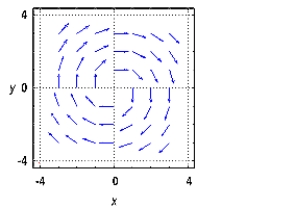
B)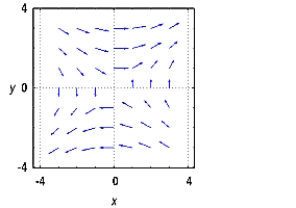
C)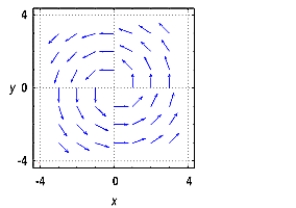
D)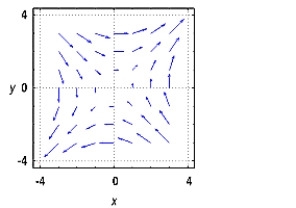
 .
.A)

B)

C)

D)


Unlock Deck
Unlock for access to all 67 flashcards in this deck.
Unlock Deck
k this deck
7
Determine if  is conservative, and if so, find a potential function
is conservative, and if so, find a potential function  of the vector field.
of the vector field.
A) is conservative with
is conservative with 
B) is conservative with
is conservative with 
C) is conservative with
is conservative with 
D) is not conservative
is not conservative
 is conservative, and if so, find a potential function
is conservative, and if so, find a potential function  of the vector field.
of the vector field.A)
 is conservative with
is conservative with 
B)
 is conservative with
is conservative with 
C)
 is conservative with
is conservative with 
D)
 is not conservative
is not conservative
Unlock Deck
Unlock for access to all 67 flashcards in this deck.
Unlock Deck
k this deck
8
Find equations for the flow lines of the vector field. 
A)
B)
C)
D)

A)

B)

C)

D)


Unlock Deck
Unlock for access to all 67 flashcards in this deck.
Unlock Deck
k this deck
9
Determine whether  is conservative, and if so, find a potential function
is conservative, and if so, find a potential function  of the vector field.
of the vector field.
A) is conservative with
is conservative with 
B) is conservative with
is conservative with 
C) is conservative with
is conservative with 
D) is not conservative
is not conservative
 is conservative, and if so, find a potential function
is conservative, and if so, find a potential function  of the vector field.
of the vector field.A)
 is conservative with
is conservative with 
B)
 is conservative with
is conservative with 
C)
 is conservative with
is conservative with 
D)
 is not conservative
is not conservative
Unlock Deck
Unlock for access to all 67 flashcards in this deck.
Unlock Deck
k this deck
10
Find the gradient field corresponding to 
A)
B)
C)
D)

A)

B)

C)

D)


Unlock Deck
Unlock for access to all 67 flashcards in this deck.
Unlock Deck
k this deck
11
Determine if  is conservative, and if so, find a potential function
is conservative, and if so, find a potential function  of the vector field.
of the vector field.
A) is conservative with
is conservative with 
B) is conservative with
is conservative with 
C) is conservative with
is conservative with 
D) is not conservative
is not conservative
 is conservative, and if so, find a potential function
is conservative, and if so, find a potential function  of the vector field.
of the vector field.A)
 is conservative with
is conservative with 
B)
 is conservative with
is conservative with 
C)
 is conservative with
is conservative with 
D)
 is not conservative
is not conservative
Unlock Deck
Unlock for access to all 67 flashcards in this deck.
Unlock Deck
k this deck
12
Compute the work done by the force field  along the curve C, where C is the portion of
along the curve C, where C is the portion of  from
from  to
to  .
.
A)
B)
C)
D)
 along the curve C, where C is the portion of
along the curve C, where C is the portion of  from
from  to
to  .
.A)

B)

C)

D)


Unlock Deck
Unlock for access to all 67 flashcards in this deck.
Unlock Deck
k this deck
13
Find the gradient field corresponding to 
A)
B)
C)
D)

A)

B)

C)

D)


Unlock Deck
Unlock for access to all 67 flashcards in this deck.
Unlock Deck
k this deck
14
Sketch several vectors in the vector field  .
.
A)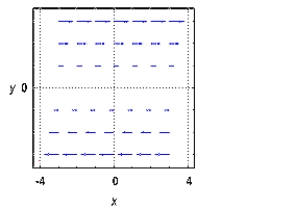
B)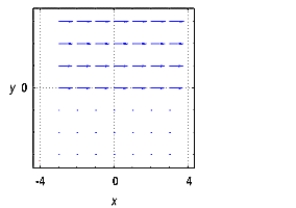
C)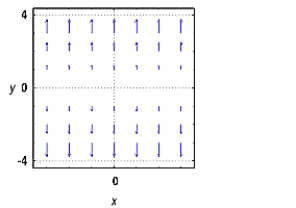
D)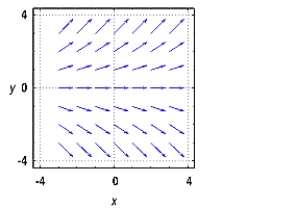
 .
.A)

B)

C)

D)


Unlock Deck
Unlock for access to all 67 flashcards in this deck.
Unlock Deck
k this deck
15
Determine if  is conservative, and if so, find a potential function
is conservative, and if so, find a potential function  of the vector field.
of the vector field.
A) is conservative with
is conservative with 
B) is conservative with
is conservative with 
C) is conservative with
is conservative with 
D) is not conservative
is not conservative
 is conservative, and if so, find a potential function
is conservative, and if so, find a potential function  of the vector field.
of the vector field.A)
 is conservative with
is conservative with 
B)
 is conservative with
is conservative with 
C)
 is conservative with
is conservative with 
D)
 is not conservative
is not conservative
Unlock Deck
Unlock for access to all 67 flashcards in this deck.
Unlock Deck
k this deck
16
Evaluate  , where C is the line segment from
, where C is the line segment from  to
to  .
.
A)
B)
C)
D)
 , where C is the line segment from
, where C is the line segment from  to
to  .
.A)

B)

C)

D)


Unlock Deck
Unlock for access to all 67 flashcards in this deck.
Unlock Deck
k this deck
17
Find the gradient field corresponding to 
A)
B)
C)
D)

A)

B)

C)

D)


Unlock Deck
Unlock for access to all 67 flashcards in this deck.
Unlock Deck
k this deck
18
Sketch the vector field. 


Unlock Deck
Unlock for access to all 67 flashcards in this deck.
Unlock Deck
k this deck
19
Find equations for the flow lines of the velocity vector field  .
.
A)
B)
C)
D)
 .
.A)

B)

C)

D)


Unlock Deck
Unlock for access to all 67 flashcards in this deck.
Unlock Deck
k this deck
20
Compute the work done by the force field  along the curve C, where C is the helix
along the curve C, where C is the helix  from
from  to
to  .
.
A)
B)
C)
D)
 along the curve C, where C is the helix
along the curve C, where C is the helix  from
from  to
to  .
.A)

B)

C)

D)


Unlock Deck
Unlock for access to all 67 flashcards in this deck.
Unlock Deck
k this deck
21
Evaluate  where
where  and C is any positively oriented simple closed curve enclosing the origin.
and C is any positively oriented simple closed curve enclosing the origin.
A) 0
B)
C)
D)
 where
where  and C is any positively oriented simple closed curve enclosing the origin.
and C is any positively oriented simple closed curve enclosing the origin.A) 0
B)

C)

D)


Unlock Deck
Unlock for access to all 67 flashcards in this deck.
Unlock Deck
k this deck
22
Determine whether  is conservative, and if so, find a potential function
is conservative, and if so, find a potential function  of the vector field.
of the vector field.
A) is conservative with
is conservative with 
B) is conservative with
is conservative with 
C) is conservative with
is conservative with 
D) is not conservative
is not conservative
 is conservative, and if so, find a potential function
is conservative, and if so, find a potential function  of the vector field.
of the vector field.A)
 is conservative with
is conservative with 
B)
 is conservative with
is conservative with 
C)
 is conservative with
is conservative with 
D)
 is not conservative
is not conservative
Unlock Deck
Unlock for access to all 67 flashcards in this deck.
Unlock Deck
k this deck
23
Set up a line integral to compute the area of the region bounded by  and
and 
 and
and 

Unlock Deck
Unlock for access to all 67 flashcards in this deck.
Unlock Deck
k this deck
24
Find the curl of  .
.
A)
B)
C)
D)
 .
.A)

B)

C)

D)


Unlock Deck
Unlock for access to all 67 flashcards in this deck.
Unlock Deck
k this deck
25
Find a potential function and evaluate the integral  where C runs from
where C runs from  to
to 
 where C runs from
where C runs from  to
to 

Unlock Deck
Unlock for access to all 67 flashcards in this deck.
Unlock Deck
k this deck
26
Use a line integral to compute the area of the region bounded by the ellipse  .
.
A)
B)
C)
D)
 .
.A)

B)

C)

D)


Unlock Deck
Unlock for access to all 67 flashcards in this deck.
Unlock Deck
k this deck
27
Evaluate  where
where  and C is the line segment from
and C is the line segment from  to
to 
A)
B)
C)

D)
 where
where  and C is the line segment from
and C is the line segment from  to
to 
A)

B)

C)


D)


Unlock Deck
Unlock for access to all 67 flashcards in this deck.
Unlock Deck
k this deck
28
Use Green's Theorem to evaluate  where C is the rectangle from
where C is the rectangle from  to
to  to
to  to
to  .
.
A) -1080
B) -135
C) -45
D) 0
 where C is the rectangle from
where C is the rectangle from  to
to  to
to  to
to  .
.A) -1080
B) -135
C) -45
D) 0

Unlock Deck
Unlock for access to all 67 flashcards in this deck.
Unlock Deck
k this deck
29
Determine whether  is conservative, and if so, find a potential function
is conservative, and if so, find a potential function  of the vector field.
of the vector field.
A) is conservative with
is conservative with 
B) is conservative with
is conservative with 
C) is conservative with
is conservative with 
D) is not conservative
is not conservative
 is conservative, and if so, find a potential function
is conservative, and if so, find a potential function  of the vector field.
of the vector field.A)
 is conservative with
is conservative with 
B)
 is conservative with
is conservative with 
C)
 is conservative with
is conservative with 
D)
 is not conservative
is not conservative
Unlock Deck
Unlock for access to all 67 flashcards in this deck.
Unlock Deck
k this deck
30
Find the divergence of  .
.
A)
B)
C)
D)
 .
.A)

B)

C)

D)


Unlock Deck
Unlock for access to all 67 flashcards in this deck.
Unlock Deck
k this deck
31
Use Green's Theorem to evaluate  where
where  and C is formed by
and C is formed by  and
and  Assume the curve is oriented positively.
Assume the curve is oriented positively.
A)
B)
C)
D)
 where
where  and C is formed by
and C is formed by  and
and  Assume the curve is oriented positively.
Assume the curve is oriented positively.A)

B)

C)

D)


Unlock Deck
Unlock for access to all 67 flashcards in this deck.
Unlock Deck
k this deck
32
Find the curl of  .
.
A)
B)
C)
D)
 .
.A)

B)

C)

D)


Unlock Deck
Unlock for access to all 67 flashcards in this deck.
Unlock Deck
k this deck
33
Use Green's Theorem to evaluate  where C is curve bounded by
where C is curve bounded by  and
and 
A)
B) 64
C)
D) 0
 where C is curve bounded by
where C is curve bounded by  and
and 
A)

B) 64
C)

D) 0

Unlock Deck
Unlock for access to all 67 flashcards in this deck.
Unlock Deck
k this deck
34
Evaluate  for
for  and C is the quarter circle from
and C is the quarter circle from  to
to  .
.
A) 0
B)
C)
D)
 for
for  and C is the quarter circle from
and C is the quarter circle from  to
to  .
.A) 0
B)

C)

D)


Unlock Deck
Unlock for access to all 67 flashcards in this deck.
Unlock Deck
k this deck
35
Evaluate  for
for  and C is the top half-circle
and C is the top half-circle  from
from  to
to  .
.
A)
B)
C) 0
D)
 for
for  and C is the top half-circle
and C is the top half-circle  from
from  to
to  .
.A)

B)

C) 0
D)


Unlock Deck
Unlock for access to all 67 flashcards in this deck.
Unlock Deck
k this deck
36
Find the curl of  .
.
A)
B)
C)
D)
 .
.A)

B)

C)

D)


Unlock Deck
Unlock for access to all 67 flashcards in this deck.
Unlock Deck
k this deck
37
Use Green's Theorem to evaluate  where C is curve bounded by
where C is curve bounded by  and
and  oriented clockwise.
oriented clockwise.
A)
B)
C)
D) 0
 where C is curve bounded by
where C is curve bounded by  and
and  oriented clockwise.
oriented clockwise.A)

B)

C)

D) 0

Unlock Deck
Unlock for access to all 67 flashcards in this deck.
Unlock Deck
k this deck
38
Show that the line integral  is independent of the path.
is independent of the path.
 is independent of the path.
is independent of the path.
Unlock Deck
Unlock for access to all 67 flashcards in this deck.
Unlock Deck
k this deck
39
Find the divergence of  .
.
A) 0
B)
C)
D)
 .
.A) 0
B)

C)

D)


Unlock Deck
Unlock for access to all 67 flashcards in this deck.
Unlock Deck
k this deck
40
Find the divergence of  .
.
A)
B)
C)
D)
 .
.A)

B)

C)

D)


Unlock Deck
Unlock for access to all 67 flashcards in this deck.
Unlock Deck
k this deck
41
Use the Divergence Theorem to compute  for
for  and Q bounded by the cube
and Q bounded by the cube  ,
,  and
and  .
.
A)
B) 0
C)
D)
 for
for  and Q bounded by the cube
and Q bounded by the cube  ,
,  and
and  .
.A)

B) 0
C)

D)


Unlock Deck
Unlock for access to all 67 flashcards in this deck.
Unlock Deck
k this deck
42
Find the outward flux of F over  where Q is bounded by
where Q is bounded by  and
and  and
and  .
.
A)
B)
C)
D) 0
 where Q is bounded by
where Q is bounded by  and
and  and
and  .
.A)

B)

C)

D) 0

Unlock Deck
Unlock for access to all 67 flashcards in this deck.
Unlock Deck
k this deck
43
Find the surface area of the cone  below the plane
below the plane  .
.
A)
B)
C)
D)
 below the plane
below the plane  .
.A)

B)

C)

D)


Unlock Deck
Unlock for access to all 67 flashcards in this deck.
Unlock Deck
k this deck
44
Compute  using the easiest method available. Q is bounded by
using the easiest method available. Q is bounded by  and
and  and
and 
A)
B)
C)
D) 0
 using the easiest method available. Q is bounded by
using the easiest method available. Q is bounded by  and
and  and
and 
A)

B)

C)

D) 0

Unlock Deck
Unlock for access to all 67 flashcards in this deck.
Unlock Deck
k this deck
45
Find the outward flux of F over  where Q is bounded by
where Q is bounded by  and
and  , and
, and  .
.
A) 0
B)
C)
D)
 where Q is bounded by
where Q is bounded by  and
and  , and
, and  .
.A) 0
B)

C)

D)


Unlock Deck
Unlock for access to all 67 flashcards in this deck.
Unlock Deck
k this deck
46
Find the flux of  across the portion of
across the portion of  below
below 
A)
B)
C)
D)
 across the portion of
across the portion of  below
below 
A)

B)

C)

D)


Unlock Deck
Unlock for access to all 67 flashcards in this deck.
Unlock Deck
k this deck
47
Determine whether the vector field is conservative and/or incompressible on R3. 
A) conservative and not incompressible
B) conservative and incompressible
C) incompressible and not conservative
D) neither incompressible nor conservative

A) conservative and not incompressible
B) conservative and incompressible
C) incompressible and not conservative
D) neither incompressible nor conservative

Unlock Deck
Unlock for access to all 67 flashcards in this deck.
Unlock Deck
k this deck
48
Find the surface area of the portion of the paraboloid  inside the cylinder
inside the cylinder  .
. 
A)
B)
C)
D)
 inside the cylinder
inside the cylinder  .
. 
A)

B)

C)

D)


Unlock Deck
Unlock for access to all 67 flashcards in this deck.
Unlock Deck
k this deck
49
Evaluate the flux integral 
 S is the sphere
S is the sphere 
A) 0
B)
C)
D)

 S is the sphere
S is the sphere 
A) 0
B)

C)

D)


Unlock Deck
Unlock for access to all 67 flashcards in this deck.
Unlock Deck
k this deck
50
Use the Divergence Theorem to compute  for
for  and Q bounded by
and Q bounded by  and
and  .
.
A) 0
B)
C)
D)
 for
for  and Q bounded by
and Q bounded by  and
and  .
.A) 0
B)

C)

D)


Unlock Deck
Unlock for access to all 67 flashcards in this deck.
Unlock Deck
k this deck
51
Set up a double integral that equals  where S is the portion of the plane
where S is the portion of the plane  above the rectangle
above the rectangle 
 where S is the portion of the plane
where S is the portion of the plane  above the rectangle
above the rectangle 

Unlock Deck
Unlock for access to all 67 flashcards in this deck.
Unlock Deck
k this deck
52
Use the Divergence Theorem to set up and evaluate a triple integral for computing the outward flux of F over  where Q is bounded by
where Q is bounded by  and
and  and
and  .
.
 where Q is bounded by
where Q is bounded by  and
and  and
and  .
.
Unlock Deck
Unlock for access to all 67 flashcards in this deck.
Unlock Deck
k this deck
53
Use Stokes' Theorem to compute  for
for  and S is the portion of a tetrahedron bounded by
and S is the portion of a tetrahedron bounded by  and the coordinate planes with
and the coordinate planes with  and
and  upward.
upward.
A)
B)
C)
D) 0
 for
for  and S is the portion of a tetrahedron bounded by
and S is the portion of a tetrahedron bounded by  and the coordinate planes with
and the coordinate planes with  and
and  upward.
upward.A)

B)

C)

D) 0

Unlock Deck
Unlock for access to all 67 flashcards in this deck.
Unlock Deck
k this deck
54
Determine whether the vector field is conservative and/or incompressible on R3. 
A) conservative and not incompressible
B) conservative and incompressible
C) incompressible and not conservative
D) neither incompressible nor conservative

A) conservative and not incompressible
B) conservative and incompressible
C) incompressible and not conservative
D) neither incompressible nor conservative

Unlock Deck
Unlock for access to all 67 flashcards in this deck.
Unlock Deck
k this deck
55
Use the Divergence Theorem to compute  for
for  and Q bounded by
and Q bounded by  and the coordinate planes.
and the coordinate planes.
A)
B) 0
C)
D) 4
 for
for  and Q bounded by
and Q bounded by  and the coordinate planes.
and the coordinate planes.A)

B) 0
C)

D) 4

Unlock Deck
Unlock for access to all 67 flashcards in this deck.
Unlock Deck
k this deck
56
Evaluate the flux integral 
 S is the portion of
S is the portion of  above the xy-plane (n upward)
above the xy-plane (n upward)
A) 0
B)
C)
D)

 S is the portion of
S is the portion of  above the xy-plane (n upward)
above the xy-plane (n upward)A) 0
B)

C)

D)


Unlock Deck
Unlock for access to all 67 flashcards in this deck.
Unlock Deck
k this deck
57
Find a parametric representation of the surface  from
from  to
to  .
.
A)

B)

C)

D)

 from
from  to
to  .
.A)


B)


C)


D)



Unlock Deck
Unlock for access to all 67 flashcards in this deck.
Unlock Deck
k this deck
58
Find a parametric representation of the surface  .
.
A)

B)

C)

D)

 .
.A)


B)


C)


D)



Unlock Deck
Unlock for access to all 67 flashcards in this deck.
Unlock Deck
k this deck
59
Set up a double integral that equals  where S is the portion of the sphere
where S is the portion of the sphere  that lies inside the cylinder
that lies inside the cylinder  and above the xy-plane.
and above the xy-plane.
 where S is the portion of the sphere
where S is the portion of the sphere  that lies inside the cylinder
that lies inside the cylinder  and above the xy-plane.
and above the xy-plane.
Unlock Deck
Unlock for access to all 67 flashcards in this deck.
Unlock Deck
k this deck
60
Determine whether  is conservative and/or incompressible.
is conservative and/or incompressible.
A) conservative and incompressible
B) conservative and compressible
C) not conservative and incompressible
D) not conservative and compressible
 is conservative and/or incompressible.
is conservative and/or incompressible.A) conservative and incompressible
B) conservative and compressible
C) not conservative and incompressible
D) not conservative and compressible

Unlock Deck
Unlock for access to all 67 flashcards in this deck.
Unlock Deck
k this deck
61
Compute  or
or  whichever is easier.
whichever is easier.  S is the part of the cone
S is the part of the cone  that lies between
that lies between  and
and 
A)
B)
C)
D)
 or
or  whichever is easier.
whichever is easier.  S is the part of the cone
S is the part of the cone  that lies between
that lies between  and
and 
A)

B)

C)

D)


Unlock Deck
Unlock for access to all 67 flashcards in this deck.
Unlock Deck
k this deck
62
Use Stokes' Theorem to compute  for
for  and C is the square
and C is the square  to
to  to
to  to
to  .
.
A)
B)
C)
D) 0
 for
for  and C is the square
and C is the square  to
to  to
to  to
to  .
.A)

B)

C)

D) 0

Unlock Deck
Unlock for access to all 67 flashcards in this deck.
Unlock Deck
k this deck
63
Use Stokes' Theorem to compute  for
for  and S is the portion of
and S is the portion of  above the xy-plane with
above the xy-plane with  upward.
upward.
A) 0
B)
C)
D)
 for
for  and S is the portion of
and S is the portion of  above the xy-plane with
above the xy-plane with  upward.
upward.A) 0
B)

C)

D)


Unlock Deck
Unlock for access to all 67 flashcards in this deck.
Unlock Deck
k this deck
64
Use Gauss' Law for electricity and the relationship  to find the total charge in the hemisphere
to find the total charge in the hemisphere  where
where  .
.
A) 0
B)
C)
D)
 to find the total charge in the hemisphere
to find the total charge in the hemisphere  where
where  .
.A) 0
B)

C)

D)


Unlock Deck
Unlock for access to all 67 flashcards in this deck.
Unlock Deck
k this deck
65
Use Stoke's Theorem to evaluate  where
where  C is the intersection of
C is the intersection of  and
and  oriented counterclockwise as viewed from above.
oriented counterclockwise as viewed from above.
A)
B)
C)
D)
 where
where  C is the intersection of
C is the intersection of  and
and  oriented counterclockwise as viewed from above.
oriented counterclockwise as viewed from above.A)

B)

C)

D)


Unlock Deck
Unlock for access to all 67 flashcards in this deck.
Unlock Deck
k this deck
66
Use Guass' Law for electricity and the relationship  to find the total charge in the hemisphere
to find the total charge in the hemisphere  for the electric field
for the electric field  .
.
 to find the total charge in the hemisphere
to find the total charge in the hemisphere  for the electric field
for the electric field  .
.
Unlock Deck
Unlock for access to all 67 flashcards in this deck.
Unlock Deck
k this deck
67
Use Stokes' Theorem to compute  for
for  and C is the boundary of the portion of the paraboloid
and C is the boundary of the portion of the paraboloid  with
with  and with
and with  to the right.
to the right.
A)
B)
C)
D)
 for
for  and C is the boundary of the portion of the paraboloid
and C is the boundary of the portion of the paraboloid  with
with  and with
and with  to the right.
to the right.A)

B)

C)

D)


Unlock Deck
Unlock for access to all 67 flashcards in this deck.
Unlock Deck
k this deck


